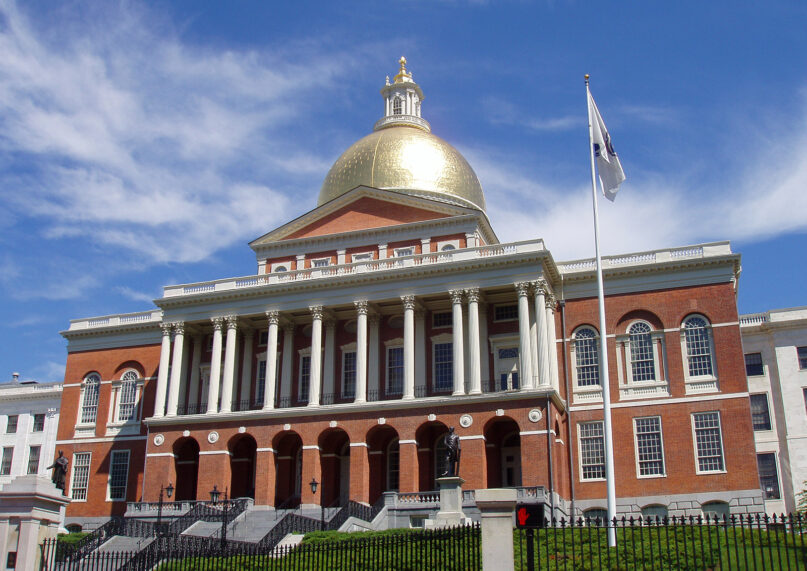(RNS) — When Mariya Taher moved to Massachusetts five years ago, she was shocked to find out the state had no legislation in place against female genital mutilation and cutting.
Taher launched a petition, which earned more than 400,000 signatures, urging the state to ban the practice. This morning, she marked the petition as victorious.
After seven years of advocacy by survivors and activists in the state, Massachusetts is now one of 39 states in the U.S. that has criminalized female genital mutilation and cutting.
“It’s giving us validation that this is not something that can be sanctioned by culture or religion, that it is a human rights violation,” said Taher, who co-founded Sahiyo, a non-profit focused on ending the practice globally, particularly among the small Indian Muslim Dawoodi Bohra sect in which she and many other girls were cut at 7 years old.
“These survivors’ voices have been heard, and acknowledged,” she said.
House Minority Leader Rep. Bradley Jones, Jr., who sponsored the legislation in the state House of Representatives, hailed Gov. Charlie Baker’s signing of the law on Thursday (Aug. 6) as “a great victory protecting some of our most vulnerable residents.” The law passed the Senate unanimously earlier this week.
Female genital mutilation or cutting, also known as FGM/C or female circumcision, refers to the removal of the external female genitalia, in part or in total, as well as any other deliberate injury to genitalia for non-medical reasons.
“The advocacy and testimonies of survivors, including Mariya Taher, was critical in moving this bill forward,” said Sen. Joe Boncore. “Medical experts have agreed that female genital mutilation has no basis in medical purposes or benefits: It is a method used to control women’s anatomy. By criminalizing female genital mutilation, we tell survivors that they are heard, and we tell girls and women that they are protected from this abuse.”
Under the new law, anyone who knowingly commits female genital mutilation on a minor — or transports them within Massachusetts or outside the state for these purposes — will face up to five years in state prison, or a fine of up to $10,000 and up to two and a half years in a county jail.
The law also tasks the public health commissioner with setting up an educational FGM/C prevention program, working with other government and non-governmental organizations to protect and assist victims, and developing recommendations for training health providers to recognize risk factors and warning signs linked to FGM/C.
Taher described the legislation as “holistic,” not only recognizing female genital cutting as gender-based violence and child abuse but also offering civil remedies for adult victims and integrating public education and outreach components.
“In communities where this is practiced, it’s very much considered a social norm, and you need to change mentalities,” she said. “Particularly for parents, there can be a lot of pressure to have it done to your daughter. Having a piece of legislation can be a prevention tool, showing that this is recognized as illegal here and reinforcing a decision to not have their girl undergo it.”
According to the Centers for Disease Control and Prevention, 513,000 women and girls across the U.S. are at risk of undergoing female genital mutilation or cutting. A CDC study found Massachusetts is home to the country’s 12th-largest at-risk population, with an estimated 14,591 women and girls at risk of undergoing the procedure.
Some experts suggest that the CDC’s data may be an overestimate, since it is a reflection of the population of refugees and immigrants coming to the state from countries where the practice is considered highly prevalent, mostly in sub-Saharan Africa and the Middle East. But Taher said it may well be an undercount.
“That data also doesn’t recognize second- and third-generation women and girls,” Taher noted. “I’m actually one of them, because I was born in the U.S. and then it happened to me when I was in India.”
Boston also has a Dawoodi Bohra mosque. The practice of cutting is strongly condemned by most Muslims, regardless of sect. But many members of the insular Bohra community — an offshoot of the Ismaili Shiite branch of Islam — believe it is a religious obligation to remove the so-called “forbidden flesh” from their young girls.
A 2017 study by Sahiyo surveyed 385 women who grew up in the Bohra community and found that 80% had experienced cutting. The tradition received national attention in 2017 when a Bohra doctor in Michigan was charged with performing FGM/C on minor Bohra girls, adding fuel to a quiet but growing internal Bohra movement against the practice.
But it is not just women and girls in immigrant communities who are vulnerable. At least two women have also spoken publicly about undergoing the procedure in white Christian communities in the Midwest, and they say they are not alone.
Since 1996, there has been a federal ban against female genital mutilation in place. Two years ago, though, a U.S. District Court judge struck down the ban as unconstitutional under the Commerce Clause, declaring that Congress did not have the authority to ban the practice. Individual states would have to do so instead.
The ruling was a massive blow to the movement against FGM/C, Taher said. But it helped galvanize a push for states to criminalize the practice. This year alone, several states, including Vermont, Wyoming, Kentucky and Idaho, have developed new laws or strengthened existing ones protecting against the practice.
“It’s been a rollercoaster ride for us here in the U.S.,” she said. “Here in Massachusetts, it was just so frustrating that we had not passed a law while we were seeing all these other states doing so. We could have done this a lot sooner.”





